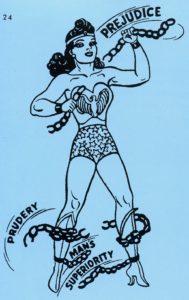
http://www.economist.com/news/americas/21661800-latin-american-women-are-making-great-strides-culture-not-keeping-up-wonder-women-and
This week’s reading had me searching for articles or video clips that respond to this notion of how successful women are shaking up machismo in the Latin community. While, I came out successful in my search and found an article titled “Wonder women and macho men” in an Argentinian magazine titled The Economist. This magazine article discusses how, although women have been great making progress towards equality with men, social attitudes towards women are not changing for the better. As women rise to the top, society keeps trying to drag them down. For example, the article opens up with a description of a caricature of Argentina’s female president, Cristina Fernandez de Kirchner is seen in a tabloid news magazine titled, Noticias, showing the president “in mid-orgasm, her head thrown back, her mouth open.“ This caricature highlights how women’s accomplishments and ambitions are often belittled by society, causing hostility towards them. The reason for this is because these thriving women are challenging machismo, masculinity, and patriarchy since having women in politics and positions of power emasculates men in many ways.
The Economist’s article relates to Pablo Martinez’s “Masculinity Reconfigured: Shaking up Gender in Latino/a Literature” article since Martinez delves on the fact that the women presented in the novels he discusses are able to defy machsimo when they find success in the U.S. Both articles highlights how Latina women are achieving the same or more than men, no matter thr backlash. Although I think it will be a while until the Latin culture fully appreciates the achievements of their women, at least women are putting up a fight against machismo.



